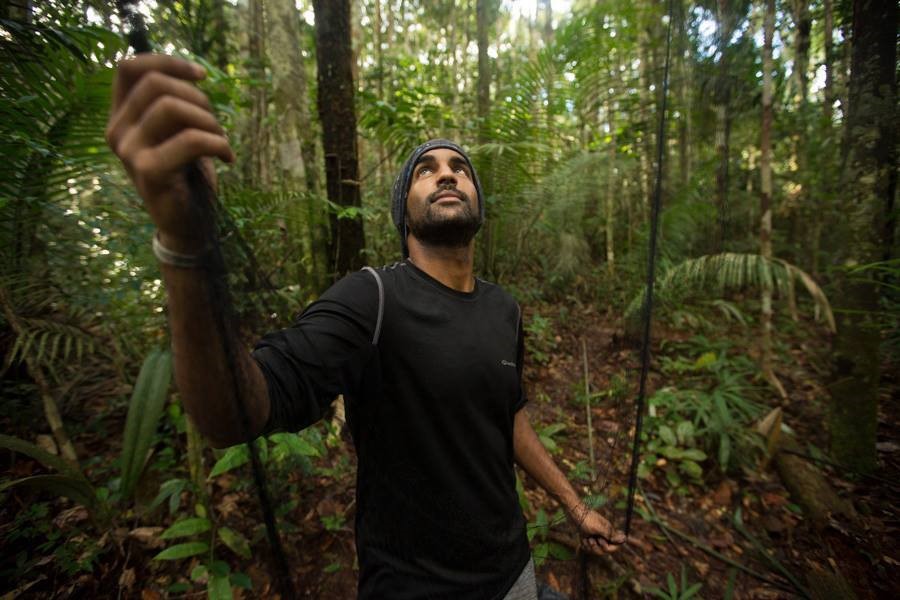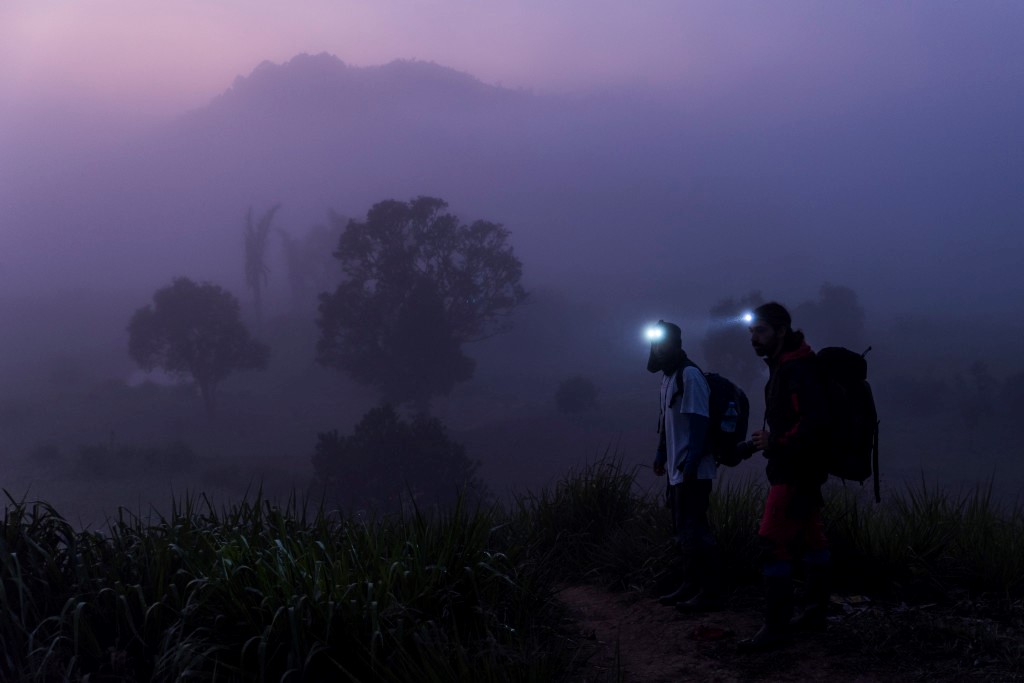University of Oxford
11a Mansfield Rd
OX1 3SZ
UK

Ricardo Rocha
Background
My PhD thesis was dedicated to the effects of tropical forest fragmentation on the spatiotemporal dynamics of bat communities and my PhD fieldwork was carried out at the Biological Dynamics of Forest Fragments Project, Central Amazon, Brazil. Between 2017 and 2019 I was a postdoc at the Conservation Science Group of the Department of Zoology, University of Cambridge working on the Conservation Evidence project and parallel to that I acted as a Scientific Adviser for Lonely Planet (non-fiction wildlife books for children). I then moved to a postdoc funded by Madeira’s Regional Agency for the Development of Research, Technology and Innovation in which I investigated the role of bats as suppressors of agricultural insect pests and human disease vectors in Madeira, Portugal and after that I became a Research Fellow at the Research Centre in Biodiversity and Genetic Resources, associated with the University of Porto and University of Lisbon.
Research Interests

My main area of interest regards the anthropogenic drivers of biodiversity loss, mainly in tropical forests and island ecosystems. My research aims to provide the evidence needed to support conservation decision making under contemporary global change, with a focus on how to restore biodiversity in the aftermath of habitat loss and fragmentation, and how to manage human-modified landscapes to retain biodiversity and maximise ecosystem-services. My work is grounded in ecological theory and involves biodiversity surveys across large-scale, manipulative experiments, “real-world” working landscapes and island ecosystems. I use a wide spectrum of ecological methods ranging from point counts and mist-netting to cutting-edge acoustic recorders, combined with state-of-the-art quantitative modelling. However, I also integrate concepts and methods from social sciences, which are critical for understanding socio-ecological systems and promoting behavioural change.
Current Research

My main projects are mostly associated with: i) investigating taxonomic, functional, and phylogenetic responses to habitat loss, fragmentation and secondary forest regeneration from both spatial and temporal perspectives, ii) identifying management options that can augment the permeability of agricultural land to disturbance-sensitive species and investigating agriculture-related ecosystem services and disservices, and iii) assessing the efficiency of conservation interventions and providing tools to facilitate and inform evidence-based decision-making, particularly in the context of invasive species in island ecosystems.
Brief CV
Education
2017 – PhD in Conservation Biology. University of Lisbon (Portugal), University of Helsinki (Finland) & Biological Dynamics of Forest Fragments Project, National Institute for Amazonian Research (Brazil).
2008 – MSc in Conservation Science. Imperial College London
2007 – Post–graduate field course in savannah ecology and conservation. Tropical Biological Association (Kenya)
2007 – BSc in Environmental Biology. University of Lisbon (Portugal)
Awards
2020 – Society for Conservation Biology Europe Section Early Career Conservation Award
2017 – Amadeu Dias Foundation Award for the best PhD in Ecology in Portugal (awarded by SPECO, the Portuguese Ecological Society).
Selected publications
Gonçalves., A.†, Nóbrega, E. K., H, Rebelo, Mata, V.A., Rocha, R. (2024) A metabarcoding assessment of the diet of the insectivorous bats of Madeira Island, Macaronesia. Journal of Mammology [†student publication]
Pashkevich, M., et al., (2024) The socioecological benefits and consequences of oil palm cultivation in its native range: The Sustainable Oil Palm in West Africa (SOPWA) Project. Science of the Total Environment 926, 171850
Órfão, I., et al., (2024) Searching for the Critically Endangered European Eel in Oceanic Islands: A Pioneer Study in the Freshwater Systems of Madeira, Macaronesia. Aquatic Conservation
Alves, J., dos Santos, Y., Guedes, P. & Rocha, R. (2024) Reassessment of the conservation status of Crocidura fingui, a shrew endemic to Príncipe Island, Central Africa. Oryx
Rowley, S., López‐Baucells, A., Rocha, R., Bobrowiec, P.E. and Meyer, C.F., (2024) Secondary forest buffers the effects of fragmentation on aerial insectivorous bat species following 30 years of passive forest restoration. Restoration Ecology, p.e14093.
Soto, E.J.†, Nunes, J., Nóbrega, E., Palmeirim, A.F. and Rocha, R. (2023). Density and ecological drivers of free‐ranging cat abundance and activity in Madeira Island, Macaronesia. Conservation Science and Practice, 5(12), p.e13040. [†student publication]
Guedes, P., Alves-Martins, F., Arribas, J.M., Chatterjee, S., Santos, A.M., Lewin, A., Bako, L., Webala, P.W., Correia, R.A., Rocha, R. and Ladle, R.J. (2023). Eponyms have no place in 21st-century biological nomenclature. Nature Ecology & Evolution, 7, 1157–1160
Festa, F., Ancillotto, L., Santini, L., Pacifici, M., Rocha, R., Toshkova, N., Amorim F., et al. (2023) Bat responses to climate change: a systematic review. Biological Reviews, 89, 19-33
Farneda, F.Z., Rocha, R., Sabhrina, A.G., López-Baucells, A., Sampaio, E.M., Palmeirim, J.M., Bobrowiec, P.E., Dambros, C. & Meyer, C.F.J. (2022) Bat phylogenetic responses to regenerating Amazonian forests. Journal of Applied Ecology
López-Bosch, D.†, Rocha, R., López-Baucells, A., Wang, Y., Si, X., Ding, P., Gibson, L. & Palmeirim, A.F. (2022) Passive acoustic monitoring reveals role of habitat affinity in sensitivity of sub-tropical East Asian bats to fragmentation. Remote Sensing in Ecology and Conservation [†student publication]
Rocha, R., López-Baucells, A. & Fernández-Llamazares, A. (2021) Ethnobiology of bats: exploring human-bat inter-relationships in a rapidly changing world. Journal of Ethnobiology 41: 3-17
Rocha, R., Fernández-Llamazares, A., López-Baucells, A., Andrimatandrina, S.F.M., Andriatafika, Z.E., Burgas, D., Temba, E.M., Torrent, L., Cabeza, M. (2021) Human-bat interactions in rural southwestern Madagascar from a biocultural lens. Journal of Ethnobiology 41: 53-69 [featured on the cover of the issue]
López-Baucells, A., Yoh, N., Rocha, Bobrowiec, P.E.D., Palmeirim, J.M. & Meyer, C.F.J. (2021) Optimising bat bioacoustic surveys in human-modified Neotropical landscapes. Ecological Applications 31: e02366
MacFarlane, D., Rocha, R. (2020) Guidelines for communicating about bats to prevent persecution in the time of COVID-19. Biological Conservation. 248: 108650
Farneda, F.Z., Grelle, C.E., Rocha, R., López-Baucells, A., Ferreira, D.F. & Meyer, C.F.J. (2020) Predicting biodiversity loss in island and countryside ecosystems through taxonomic and functional biogeography. Ecography 43(1): 47-106 [featured on the cover of the issue]
Kemp, J., López-Baucells, A., Rocha, R., Wangensteen, O.S., Andriatafika, Z., Nair, A. & Cabeza, M. (2019) Bats as potential suppressors of multiple agricultural pests: a case study from Madagascar. Agriculture, Ecosystems and Environment, 269(1): 88-96
Rocha, R., Ovaskainen, O., López-Baucells, A., Farneda, F.Z., Sampaio, E., Bobrowiec. P.E.D., Cabeza, M., Palmeirim, J.M. & Meyer, C.F.J. (2018) Secondary forest regeneration benefits old-growth specialist bats in a fragmented tropical landscape. Scientific Reports, 8, 3819
Conenna, I.*, Rocha, R.*, Russo, D. & Cabeza, M. (2017) Insular bats and research effort: a review of patterns and priorities worldwide. Mammal Review, 47, 169–182 *These authors contributed equally to this work [featured on the cover of the issue]
Rocha, R., López-Baucells, A., Farneda, F.Z., Groenenberg, M., Bobrowiec. P.E.D., Cabeza, M., Palmeirim, J.M. & Meyer, C.F.J. (2017) Consequences of a large-scale fragmentation experiment on Neotropical bats: disentangling the relative effects of local and landscape-scale attributes. Landscape Ecology, 32, 31-45
Eklund, J., Blanchet, G., Nyman, J., Rocha, R., Virtanen, T. & Cabeza, M. (2016) Contrasting spatial and temporal trends of protected area effectiveness in mitigating deforestation in Madagascar. Biological Conservation, 203, 290–297
Rocha, R., Tarmo, V. & Cabeza, M. (2015) Bird assemblages in a Malagasy forest-agricultural frontier: effects of habitat structure and landscape-scale forest cover. Tropical Conservation Science, 8(3): 681-710.
Recent media interest
2023 – Hitler beetle, Trump moth, Beyoncé fly: is it time to rethink naming of species – The Guardian
2022 – ‘Ricardo Rocha: Explorer of the month’ – National Geographic Kids magazine
2022 – ‘They saw bigger things’: Richard Leakey, Edward Wilson & Thomas Lovejoy remembered – The Guardian
2022 – Killing bats no answer to spread of new pathogens – South China Morning Post
2022 – Bats: the amazing diversity – Austrian Broadcasting Corporation / radio FM4
2021 – Bats: Friend or foe? – BBC Radio
2021 – To Save Bats and Their Habitats, We Must Protect the Land Rights of Indigenous People – Scientific American
2020 – Covid: Why bats are not to blame, say scientists – BBC News
